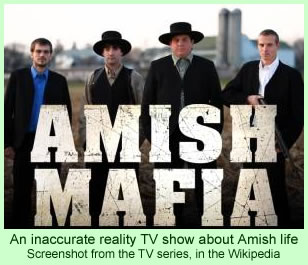Amish “reality” shows often create unreal, inaccurate impressions of the well-known peaceful society, according to prominent scholar David Weaver-Zercher. The professor at Messiah College in south central Pennsylvania gave a public lecture on Tuesday evening, March 26, entitled “Amish Behaving Badly? Amish Realities and Amish Reality Shows.”
According to a news report about his lecture, Weaver-Zercher evidently did not deny that occasionally Amish do act badly, but he made it clear that the published accounts often get things messed up. For instance, he discussed a 1998 case involving a drug bust of two men, both named Abner Stoltzfus. Even though they were supposedly Amish, neither had actually been baptized—so they really were not members of that community.
He also went over the more recent events in Bergholtz, Ohio, where the errant Amish bishop, Sam Mullet, led attacks against other Amish. Mullet and a number of his followers were subsequently convicted and sentenced to federal prisons for attacks that had fit the definition of hate crimes.
In fact, Weaver-Zercher said, the ordination of Mullet as a bishop was only witnessed by one other bishop. This was in sharp contrast to the normal Amish custom of having more than one bishop attend ordinations. Several of the practices at Bergholtz—the way they did not hold regular Sunday worship services, the harsh disciplinary style of Mr. Mullet, and of course his advocating physical force against individuals he perceived of as enemies—all were contrary to normal Amish culture. The Bergholtz people could perhaps be better referred to as “Amish-like” rather than “Amish.”
The professor discussed the various Amish so-called reality shows by pointing out how they are scripted ahead of time, how directors coach participants in the proper ways to deliver their lines, and the nature of the scripts—the “reality” experience. He admitted that he is repeatedly asked whether the reality shows are real. And more to the point, do they portray Amish life realistically?
His response was to break the question down into three phases. Are the actors really Amish? Are they in fact actually depicting themselves? Are the facts being depicted accurately? In reply, he said that the essence of being Amish is to be a baptized member of an Amish church, and living under the discipline of that church.
He argued that even though people are born Amish and continue to live, as adults, in the homes of their parents, they are only actually Amish if they are baptized and join the church. The actors on the show “Amish Mafia,” when they discussed the question of being baptized on camera, were, by his definition, not really Amish. At least, not yet. He did say that the actors on popular shows, such as “Breaking Amish,” are born into Amish families—they are “genetically Amish.” They come from the community.
As far as accuracy is concerned, he believes that the National Geographic show “Amish: Out of Order” is relatively accurate, whereas the series “Amish Mafia” is not.
